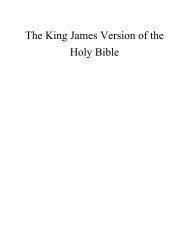Free End Times Book (pdf).. - Rapture Notes
Free End Times Book (pdf).. - Rapture Notes
Free End Times Book (pdf).. - Rapture Notes
You also want an ePaper? Increase the reach of your titles
YUMPU automatically turns print PDFs into web optimized ePapers that Google loves.
This filling with the Holy Spirit was followed by a powerful message by Peter to the crowds that had gathered. He<br />
made many references to the Hebrew Scriptures, and showed how Jesus was indeed the long-awaited Messiah (Acts<br />
2:14-40).<br />
Three thousand out of the gathered crowd became believers that day and were all baptized immediately (Acts<br />
2:41).<br />
This was the beginning of the church. As mentioned before, all the first believers were Jewish, and all of them<br />
understood that what they were doing was totally compatible with their Jewish history and Scriptures.<br />
The word "church" is very similar to the word "synagogue." The Greek word for church was ekklesia, which means<br />
"called out," "an assembly." The Greek for synagogue is sunagoge, meaning "gathering together." Neither of these<br />
words are used in the <strong>Book</strong> of Acts until a little later. ("church" in Acts 5:11 and "synagogue"--implied in Acts 6:9,<br />
and actually used in Acts 13:14). When the words were used, it was always clear that the church referred to the new<br />
sect of Christians, while the synagogue referred to traditional Jewish groups.<br />
Therefore, there are both similarities and differences between the new "church" and the old "synagogue." The<br />
differences were not contradictory. The new group saw itself as a continuation of the old, believing that Yesuha<br />
(Jesus) was the fulfillment of the promise of a Messiah.<br />
The Feasts and Fulfilled Prophecy<br />
Since the Holy Spirit was given on the Day of Pentecost, and this is considered the birthday of the church, it is<br />
helpful to study the connection between other major Feasts of Israel and God's prophetic timetable.<br />
Leviticus 23 -is the key passage which describes the original seven feasts.<br />
The Passover Supper (Pesach)- Leviticus 23:4-5<br />
The Feast of Unleavened Bread - Leviticus 23:6-8<br />
The Feast of Firstfruits - Exodus 23:19; Leviticus 23:9-14<br />
The Feast of Weeks - Leviticus 23:16-21, (Also called Pentecost- meaning 50 days after Feast of Firstfruits)<br />
(Also called The Feast of Harvest)<br />
Rosh Hashanah - New Year's Day - Leviticus 23:23-24, (Also called The Feast of Trumpets)<br />
Yom Kippur - The Day of Atonement - Leviticus 23:26-32<br />
The Feast of Tabernacles (Sukkot) - Leviticus 23:33-34, 42-43; (Also called The Feast of Ingathering)<br />
Since that time several others have been added, such as<br />
Purim and The Feast of Lights (Hanukkah).<br />
These holy days were symbolic of things to come.<br />
"Therefore do not let anyone judge you by what you eat or drink, or with regard to a religious festival, a New<br />
Moon celebration or a Sabbath day. These are a shadow of the things that were to come; the reality, however, is<br />
found in Christ." (Colossians 2:16-17)<br />
It is surprising how many of the most important events in Jewish and Christian history have occurred on one of these<br />
dates, especially when one notices the correlation between the events and what the corresponding feast originally<br />
signified. Grant Jeffrey points out that all of the feasts and fasts of Israel have had significant historical events occur<br />
on their anniversaries.<br />
Thy Kingdom Come, Thy Will be Done… 21



